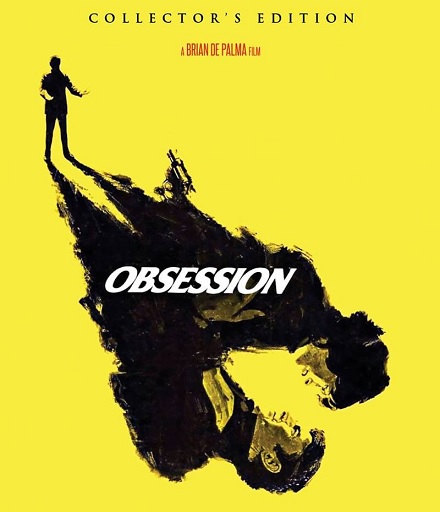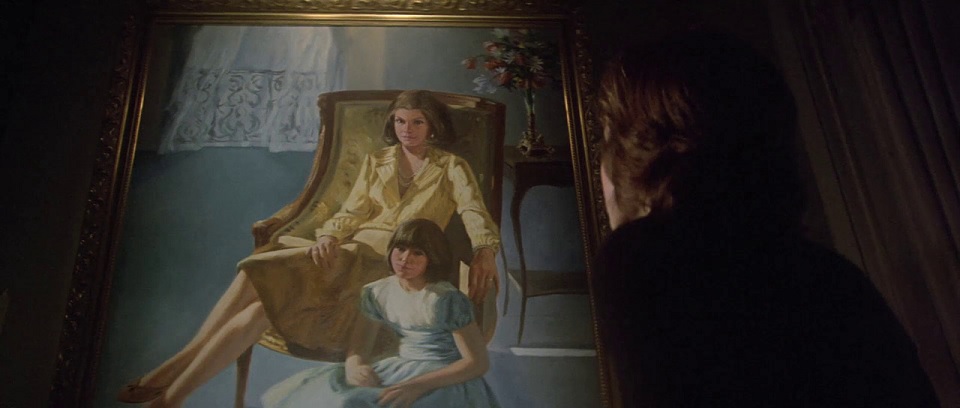PRE-ORDER FROM SHOUTFACTORY GETS YOU A FREE POSTER OF NEW ART BY SONNY DAY
 Shout! Factory today revealed details about its collector's edition Blu-ray of Brian De Palma's Obsession, which will be released January 15, 2019:
Shout! Factory today revealed details about its collector's edition Blu-ray of Brian De Palma's Obsession, which will be released January 15, 2019:Bonus FeaturesNEW Audio Commentary With Author Douglas Keesey (Brian De Palma’s Split-Screen: A Life In Film)
NEW Producing Obsession – An Interview With Producer George Litto
NEW Editing Obsession – An Interview With Editor Paul Hirsh
Obsession Revised – Vintage Featurette Featuring Interviews With Director Brian De Palma, Cliff Robertson, And Geneviève Bujold
Theatrical Trailer
Radio Spots
Still Gallery

If you pre-order from Shout! Factory, they are still offering "a FREE 18" X 24" ROLLED POSTER" featuring the new cover artwork by Sonny Day, although "due to a manufacturing delay," Shout! "can no longer guarantee early shipping on this title." The original poster art for Obsession will be included on the other side of the reversible sleeve.
The chapter on Obsession in Keesey's book, Brian De Palma’s Split-Screen: A Life In Film, delves into the highly intriguing biographical links between the film and De Palma's personal life:
Like Sandra, the young De Palma tended to idealize his mother and to demonize his father. If Michael, according to Elizabeth's diary, was "busy at work all day," so was De Palma's father. Elizabeth's feelings of abandonment ("sometimes I wonder if Mike loves me as much as his business") were then dealt a killing blow by the ultimate desertion-- his failure to pay the ransom money, which led to her death. Young Sandra felt equally deserted, sharing her mother's pain. We recall that it was Sandra's voice on the tape recording, pleading for her father to save them. As a result of his neglect, she vowed to get revenge and undertook a secret plot against Michael. As we know, De Palma's father compounded his workaholic "desertion" by sleeping with a nurse at the office, which led to a suicide attempt on the part of De Palma's mother. (She was saved by De Palma himself, who took her to the hospital.) De Palma then used the tape recorder his mother had given him for Christmas to try to avenge her, secretly capturing his father's phone conversations-- and later surreptitiously filming him-- to gather evidence of adultery so that his mother could divorce him. "I identify with the avenging child," De Palma once said in a direct comparison of himself to Sandra.But the comparison doesn't stop there. Just as Sandra eventually realized how much her demonization of her father was due to Bob's manipulation of her to believe what he wanted her to believe-- the very worst about Michael's motives ("[He] just can't come up with the money, not for Elizabeth and not for you"), so De Palma came to see that "my mother had manipulated me": "My brothers and I had only had my mother's point of view, and she spoke of daddy as an outsider, leagued against us. She told us, 'He's the bad one; you, you're with me; blame him.'" In the children's eyes (Sandra's, De Palma's, and his brothers'), the father was as guilty and despised as the mother was innocent and idealized. (It is interesting to note that De Palma's brother Bart painted the portrait of Elizabeth that Sandra idolized.) However, both Sandra and De Palma later gained a more mature understanding to challenge their one-sided, childish perceptions of their fathers: "I gradually came to appreciate my father's point of view"; "in truth-- but I understood this only much later-- he was just a man who threw himself into his work so that he could forget his marriage troubles." Similarly, in Rebecca, Fontaine grows to understand that her husband/father figure Maxim isn't as demonic as she feared and her predecessor/mother figure Rebecca isn't as worthy of idolatry.




